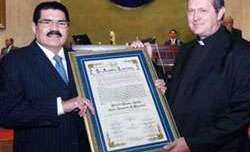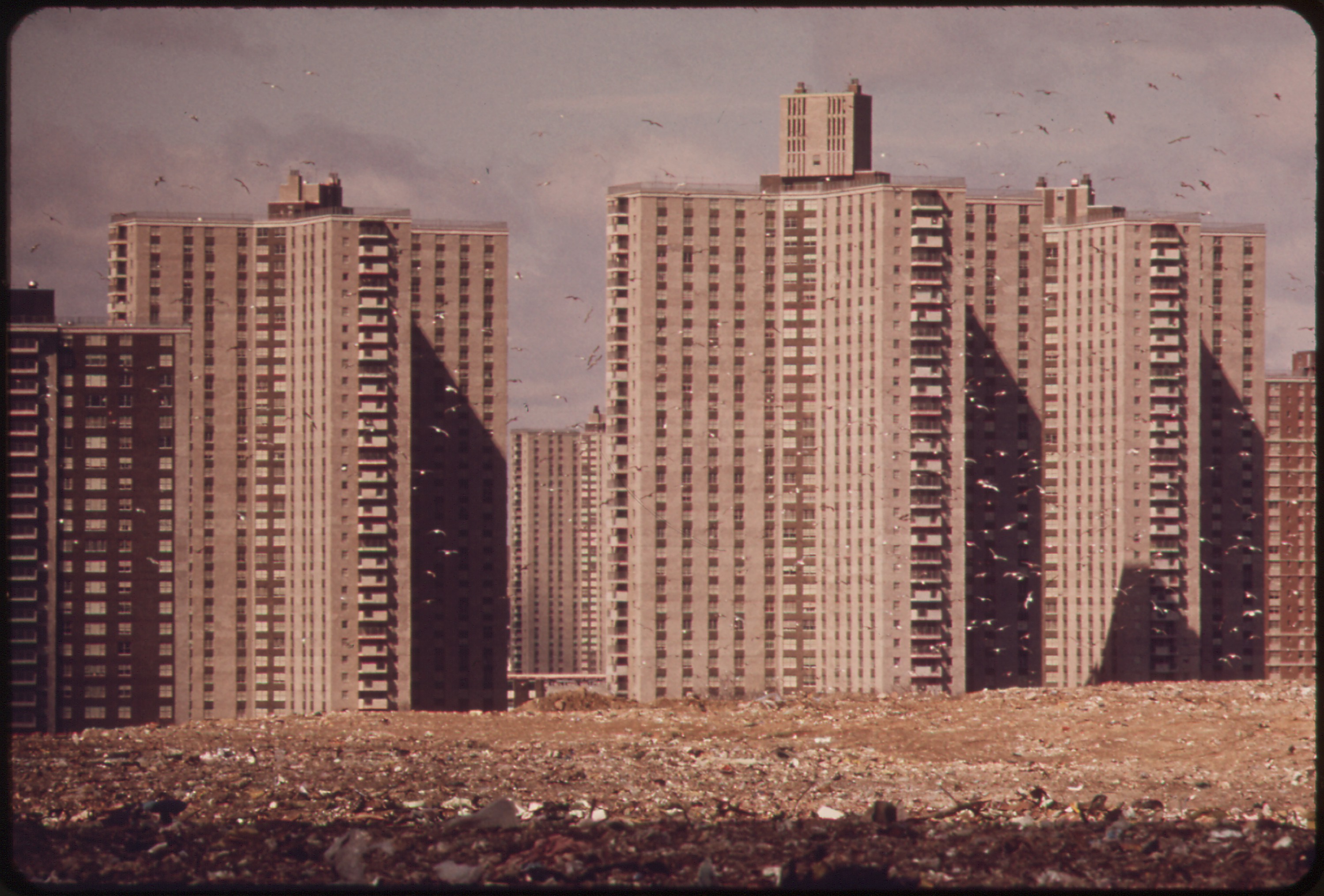Americans are facing tough questions about their responsibilities in what’s being called a new world order—a new historic moment when ancient hatreds and long-ignored injustices have flared into ethnic and religious wars that have already claimed millions of victims.
As the borders and assumptions of the Cold War years are redrawn, many find that their old moral coordinates are shifting as well.
As members of the largest religious group in the world’s most powerful nation, some American Catholics are asking what their attitude should be toward this changed and violent world, and how that relates to the Gospel of Jesus and the teachings of their Church.
Most pointedly, some wonder what is morally required of them in the face of the innocent sufferings of fellow believers and persons around the world.
 The challenges to the Catholic conscience have crystallized in the moral debate over “humanitarian intervention”—the emerging notion that nations have a “right to interference” in the affairs of other nations in cases of instability and injustice.
The challenges to the Catholic conscience have crystallized in the moral debate over “humanitarian intervention”—the emerging notion that nations have a “right to interference” in the affairs of other nations in cases of instability and injustice.
That notion marks a sharp departure from the current guiding principles of international statecraft, in which nations are presumed to have near-absolute right to conduct affairs within their borders free from outside meddling.
Catholic activists and war-and-peace experts agree that interventions to thwart injustice or gross human-rights violations are consistent with long-held Church teaching. Especially since Pope John XXIII’s 1963 encyclical, Pacem in Terris (“Peace on Earth”), it has been argued that the rights of people transcend the sovereignty of nations, and that states have no meaning or validity apart from their service of human needs.
“From the point of view of Catholic social teaching, governments have no legitimacy if they are not willing to safeguard human rights” within their borders, explained Father Drew Christiansen, a Jesuit who serves as the American bishops’ top adviser on foreign affairs. “That is what John Paul has been trying to make clear.”
While Pope John Paul II has avoided direct mention of armed force, he has said in recent months that “humanitarian intervention” is “obligatory where the survival of populations and entire ethnic groups is seriously compromised.”
Further, according to Pope John Paul, nations have “no right to indifference” when others are suffering violence. “Their duty,” he argues, “is to disarm the aggressor.”
Motives Suspected
Some pacifists and others in the Catholic community, while sharing the Pope’s concern about justice in the world, are wary of embracing new wars in the name of humanity. “I support the notion of intervention if it comes from the belief that we’re all one family and we’re intervening because we care about each other and we’re going to use nonviolent tactics that respect the culture and people,” said longtime peace activist Shelley Douglass. “But I’m not sure that’s the direction we’re headed in.”
Douglass, who operates a Catholic worker hospitality house in Birmingham, Ala., is among those who suspect that “humanitarian intervention” is being seized upon to provide moral window dressing for American ambitions in the post-Cold War world. “I fear that this idea gives a blank check to the military, which is already absorbing too much of our resources, and validates the military as our great white knight going out to solve all the problems of the world with arms,” said Eileen Egan, one of the founders of Pax Christi, the independent international Catholic peace organization.
Noting that America’s invasion of Grenada and Panama and the most recent war against Iraq were labeled “humanitarian” missions, Egan and others expressed concern that the new theory is merely a new way to justify offensives aimed at securing resources, markets and outposts in the Third World.
However, Jesuit Father John Langan, an authority on the ethics of war at Woodstock Theological Center in Washington, said such concerns reflect “reflex patterns” developed in the Cold War era.
Imputing of dark motives and imperialist designs to the American government isn’t really relevant today, he said, because “the adversaries are different, and the way America behaves is somewhat different.”
According to George Weigel, a Catholic who heads the Center for Ethics and Public Policy in Washington, to follow the pacifists’ absolute rejection of violent means to resolve conflicts would be a recipe for appeasing injustice and even genocide in these post-Cold War years.
“It’s just a morally unserious position,” he said, criticizing Pax Christi’s refusal to support the United Nations humanitarian intervention in Somalia. “You can’t seriously say that you want this process of human degradation in Somalia to stop unless you will the means that will give you a reasonable chance of success in making that happen.”
New Criteria for A New Kind of War
The December 1992 U.N. decision to send troops to Somalia has split veteran Catholic pacifists.
Some, like Gordon Zahn, supported the Somali effort as a “police action” aimed at restraining combatants and keeping peace by protecting innocents from criminal acts. Others, like Jesuit Fathers Richard McSorley and Daniel Berrigan, denounced what they called “selective homicide for humanitarian reasons.”
Weigel, who has long argued for a more forceful American role in promoting the “universal common good” believes Catholics should help shape an ethic that allows “the proportionate use of armed force” to protect human rights, save lives and disarm tyrants and other belligerents.
Discussing what shape such a new ethic should take, Father Francis Winters, professor at Georgetown University’s School of Foreign Service, said that Catholics’ “just-war” tradition would permit interventions aimed at restoring civil order in an emergency, stopping attacks on civilians, and preventing genocide.
However, he added, Catholic tradition would not support interventions simply “to change a government against its will,” such as the American invasion of Panama in 1989.
Father Langan suggested that “just cause” for intervention exists in “acute emergency situations where the lives of large numbers of people are at risk, or where a government is breaking down or where it is actively responsible for massive human-rights violations.”
Catholic theorists emphasize that armed force must be “a last resort,” after negotiations and other nonviolent efforts such as sanctions and embargoes have failed. Interventions should be conceived as “short-term” operations not long-term occupations, they add. Also, interventions should have limited and clearly defined goals, such as securing a cease-fire between rivals or protecting relief shipments.
It is preferable, although not required, that such operations be conducted by the United Nations with the consensus of regional alliances, such as the Conference on Security and Cooperation in Europe or the Organization of American States. But Catholic theorists claim that unilateral American interventions, and missions where humanitarian aid and national interest coincide, might prove morally and politically necessary and should not be ruled out.
Father Langan warned that in intervening in the Third World, the world’s rich nations will have to be careful to not stir up resentments and animosities that may be held over from colonial times. “The shadows of colonialism” are always going to be present in such operations, he said.
Father Winters added that interventions in less-developed countries pose special problems for meeting traditional Catholic prohibitions against targeting civilians, because military-command centers are often tied to the civilian-utility system and economy in such countries.
“No matter how good the cause, force can never be used against civilians, even indirectly,” he cautioned. “If a military target is also indispensable to civilians, like an electric grid, it can’t be attacked because to do so would risk threatening civilian lives.”
Moral Calculus and National Ambition
Catholic peace activists reject all such moral calculus about intervention. Instead, they stress the need to expose and root out the causes of humanitarian crises, which they identify as poverty and injustice. Moreover, they contend that the multibillion-dollar flow of weapons from America to the Third World is a prime contributing factor in these crises.
Joseph Fahey, a pioneer in the academic study of peace who teaches at Manhattan College, N.Y., is disappointed that more attention has not been paid to what he says are more than 4,000 “documented means” of nonviolent conflict resolution and civilian-based defense against aggression.
He and others support the notion of “peace brigade,” a regiment trained in nonviolent tactics that could be deployed in crises to stand between belligerent forces or to form “peace camps” within war zones and help rebuild war-torn countries.
Catholics on both sides of the intervention question concur that resurgent ethnic and religious nationalism will continue to shape the post-Cold War era and make demands on American Catholic consciences.
Father Christiansen would like to see the United Nations enhanced to handle new challenges. He suggested enlarging the U.N. peacekeeping force and giving it tough new authority to police agreements and possibly to intervene in crises.
“We need to strengthen the U.N. to anticipate crises and to deal with them before there is a need for massive outside humanitarian relief,” he added.
Catholics on both sides also agreed that America will have to avoid the ever present temptation of becoming what Weigel characterized as “the world’s 9-1-1 system.”
Signaling, perhaps, a new interventionist attitude, President Bill Clinton said in his inaugural address that American military force might be used not only to defend the country’s “vital interests,” but also in cases where “the will and the conscience of the international community is defied.”
Likewise, Catholics who support the notion of humanitarian intervention mentioned numerous areas in the world where “just cause” might already exist, including Haiti, Sudan, Liberia, and Bosnia-Herzegovina.
According to Father Winters, with such a “plethora of anarchic situations” in the world, it will be necessary to assign priorities and criteria to set limits on the impulse toward American intervention.
The post-Cold War world is shaping up as a chaotic and violent one, fraught with moral questions and ambiguous, uncertain answers.
“It is hard; it is hard,” said Egan, expressing the doubts and anguish of many Catholics about one such case of violence and chaos—Bosnia. “And yet I ask myself, would one more corpse—which would be the result of an armed intervention—help that situation?”
First published in Our Sunday Visitor (April 18, 1993)
© David Scott, 2009. All rights reserved.


